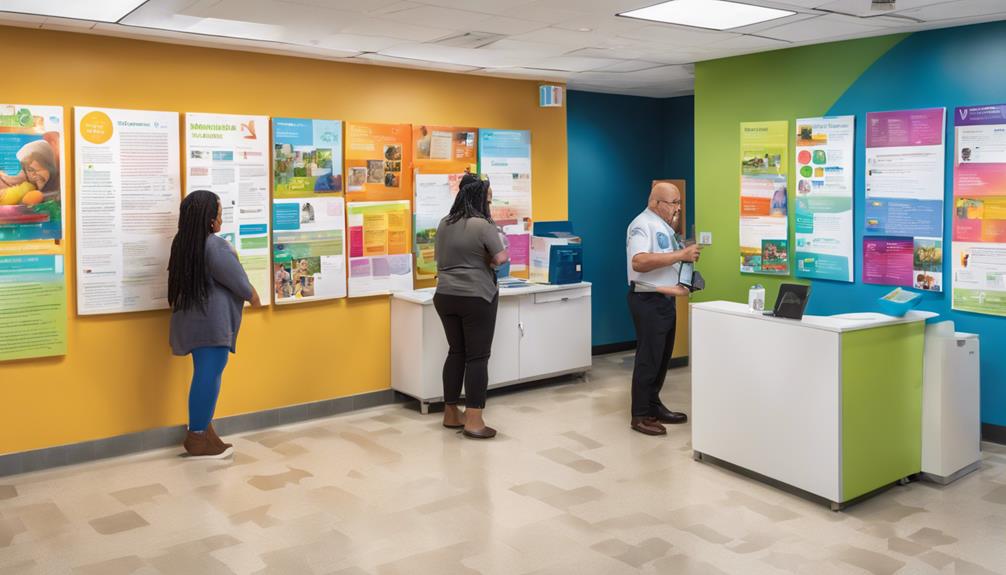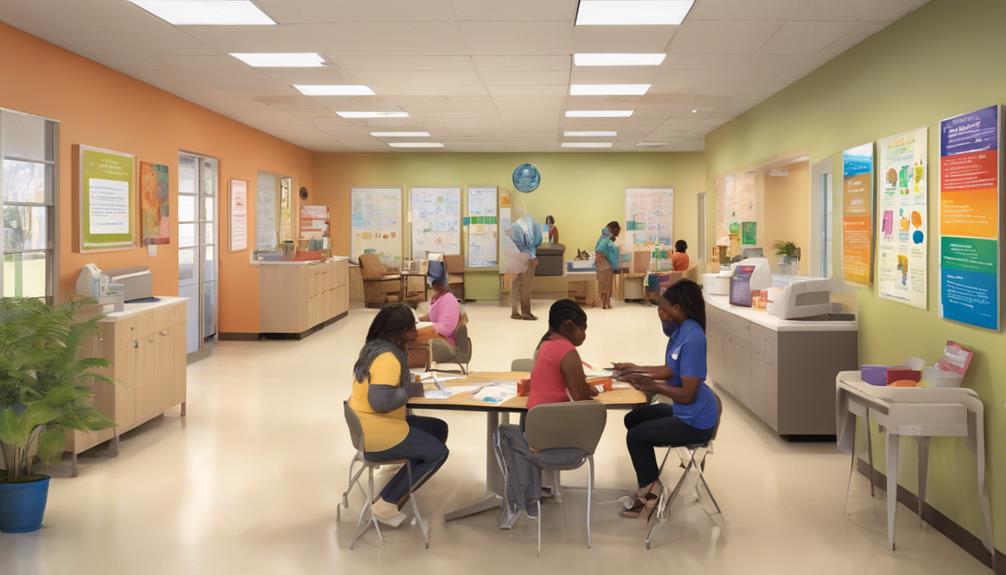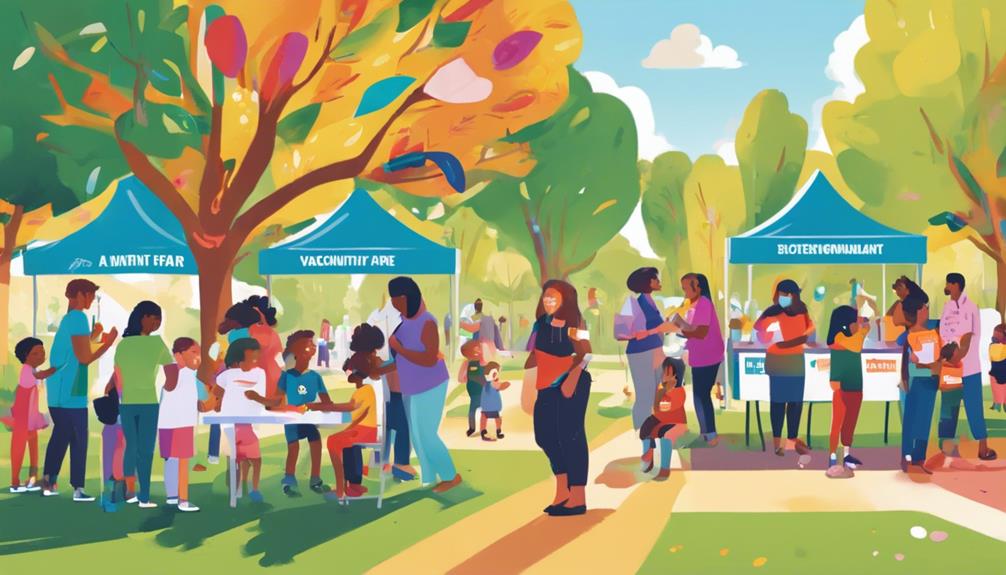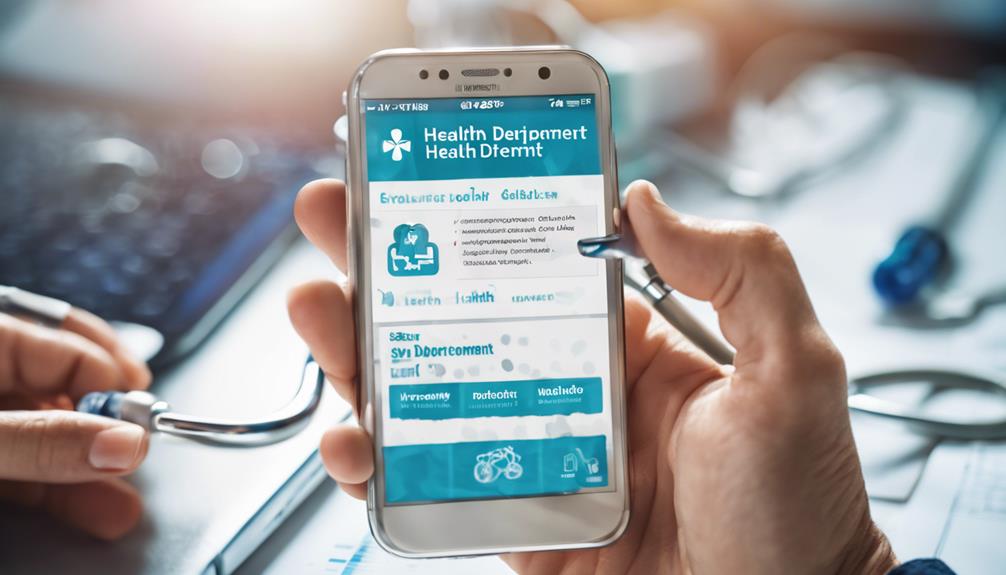You can find your local health department by checking your state or county's official website. There, you'll discover contact information and resources specifically for your community. If you prefer direct communication, giving them a call can provide you with immediate help and guidance on services offered. Many health departments also share updates through social media or community bulletins, so it's worth keeping an eye on those platforms too. By reaching out, you'll not only get the information you need, but you might also uncover valuable resources and initiatives designed to support your health and wellness.
Importance of Local Health Departments

Local health departments play an essential role in safeguarding communities by promoting public health initiatives and responding to health crises. They're your frontline resource for ensuring that all community members have access to the health services they need. By actively engaging with residents, these departments foster trust and collaboration, allowing for tailored health programs that resonate with local needs.What Is Heated YogaWhen To Start Prenatal YogaHow Many Calories Does Doing Yoga Burn
Community engagement isn't just a buzzword; it's crucial for achieving health equity. When local health departments listen to the voices of diverse community members, they can identify barriers to health and address them effectively. This means everyone, regardless of socioeconomic status, has a fair opportunity to achieve their best health.
Moreover, local health departments work to educate the public on important health issues, from vaccinations to chronic disease prevention. They coordinate responses during health emergencies, ensuring timely information reaches you and your neighbors.
Finding Your Local Health Department
To locate your health department, start by visiting your state or county's official website, where you'll find contact information and resources tailored to your community's needs. Most websites have a dedicated section for health services, making it easy to find health department locations near you.
Once you identify your local department, explore the various community health initiatives they offer. These initiatives can range from vaccination programs to health education workshops, aimed at improving the overall well-being of residents. You might also discover resources on nutrition, mental health support, and disease prevention strategies that cater specifically to your community's demographics.
If you prefer a more personal touch, consider calling your local health department directly. The staff can guide you to the right programs and services, ensuring you're well-informed about what's available.
Additionally, don't hesitate to check social media pages or community bulletins for updates on health events and initiatives.
Services Offered by Health Departments

Health departments play an important role in your community by offering essential services like immunization programs to keep you and your family healthy.
They also conduct health inspections to guarantee local establishments meet safety standards.
Plus, you can benefit from community health education that empowers you with knowledge to make informed health choices.
Immunization Programs Available
Immunization programs offered by health departments play an important role in protecting communities from preventable diseases. These programs guarantee that vaccines are accessible to everyone, regardless of their financial situation. By providing low-cost or free immunizations, health departments help eliminate barriers that might prevent individuals from getting vaccinated.
You can take advantage of various immunization outreach initiatives organized by local health departments. These initiatives often include community events, school-based vaccination clinics, and mobile vaccination units. This proactive approach encourages you and your family to stay up to date with immunizations, making it easier to protect yourselves and others.
Health departments also educate the public about the significance of vaccines and address common concerns or misconceptions. They offer resources to help you understand which vaccinations are required for school entry or recommended for specific age groups.
Health Inspections Conducted
Local health departments conduct regular inspections to verify that restaurants, food vendors, and other facilities meet safety and sanitation standards. These inspections play an essential role in guaranteeing food safety and protecting public health. When you eat out or buy prepared food, you want to trust that the establishment has passed these inspections and adheres to proper sanitation practices.
During an inspection, health inspectors assess various factors, including food handling procedures, cleanliness of the environment, and proper food storage techniques. They check to see if the staff follows hygiene protocols, such as washing hands and using gloves. Any violations can lead to immediate corrective actions, helping to prevent foodborne illnesses.
You might wonder how often these inspections occur. It varies by location and type of establishment, but most restaurants are inspected at least once a year. In some cases, high-risk facilities may be inspected more frequently to verify compliance with sanitation standards.
Community Health Education
Alongside inspections, health departments also offer community health education programs aimed at promoting wellness and preventing disease. These initiatives are designed to empower you and your neighbors with the knowledge and resources necessary for maintaining your health.
One key aspect of these programs is community outreach. Health departments often collaborate with local organizations to reach diverse populations, ensuring everyone has access to essential health information. Whether it's through informational pamphlets, social media campaigns, or community events, they work hard to engage you in meaningful ways.
Additionally, health workshops are another integral part of community health education. These workshops cover a range of topics, from nutrition and exercise to chronic disease management and mental health. By participating in these interactive sessions, you can gain practical skills and strategies to improve your well-being.
Ultimately, the goal of community health education is to create a healthier environment for everyone. By taking advantage of these services, you not only enhance your own health but also contribute to the overall well-being of your community. So, don't hesitate to explore the resources available through your local health department!
Health Education Resources Available
You can access a variety of health education resources designed to inform and empower your community about important wellness topics. One key initiative is health literacy initiatives, which aim to improve your understanding of health information. These programs provide valuable tools that help you navigate medical terminology, treatment options, and healthier lifestyle choices.
Additionally, consider participating in preventive care workshops. These workshops focus on essential health practices that can prevent disease and promote overall well-being. They often cover topics such as nutrition, exercise, mental health, and chronic disease management, providing you with practical advice and strategies you can implement in your daily life.
Many local health departments and community organizations host these resources, making them easily accessible. You can usually find information about upcoming workshops, educational materials, and online resources on their websites.
Engaging with these programs can enhance your health literacy and empower you to make informed decisions about your health. By staying proactive and involved, you'll not only benefit yourself but also contribute to a healthier community.
Don't underestimate the power of knowledge; it's your best tool for achieving and maintaining wellness.
Vaccination and Immunization Programs

Vaccination plays an essential role in keeping you and your community healthy by preventing the spread of infectious diseases.
You'll want to familiarize yourself with the immunization schedule to guarantee you and your family are protected at the right times.
Plus, accessing local vaccination programs can make it easier than ever to stay up to date on your immunizations.
Importance of Vaccination
Immunizations play an essential role in protecting both individual and community health by preventing the spread of infectious diseases. When you get vaccinated, you not only safeguard yourself but also contribute to herd immunity, which is crucial for those who can't be vaccinated, like infants or individuals with certain medical conditions.
Unfortunately, vaccine misconceptions can lead to hesitancy and decreased vaccination rates. Many people worry about side effects or believe that vaccines aren't necessary. However, the benefits far outweigh the risks.
Vaccines have been proven to save millions of lives each year by effectively controlling diseases such as measles, polio, and influenza.
Immunization Schedule Overview
An immunization schedule outlines the specific vaccines recommended at various ages, guaranteeing timely protection against preventable diseases. For instance, during infancy, you'll see vaccines like Hepatitis B and DTaP (diphtheria, tetanus, and pertussis) highlighted. As your child grows, the schedule includes essential childhood vaccinations like MMR (measles, mumps, and rubella) and varicella (chickenpox).
Sticking to this schedule helps safeguard your child and the community against outbreaks. However, many parents face vaccine hesitancy, often fueled by misinformation or concerns about vaccine safety. It's important to address these fears with reliable information from trusted healthcare providers.
Using the immunization schedule as a guide, you can easily keep track of when each vaccine is due. Remember, each vaccine plays a significant role in building immunity, not just for your child but for those around them who may be vulnerable.
Accessing Local Programs
Finding local vaccination and immunization programs is key to ensuring your child receives timely protection against preventable diseases, just as outlined in the immunization schedule. To access these essential services, start by checking your local health department's website or calling them directly. They often provide information on available programs and their locations.
Community outreach initiatives play a significant role in making vaccination programs accessible to everyone. Many health departments partner with schools, community centers, and clinics to offer immunization clinics and educational events. These outreach efforts not only improve program accessibility but also raise awareness about the importance of vaccinations.
You can also look for local non-profits or health organizations that focus on promoting immunizations. They can provide valuable resources and support for exploring the available programs.
Don't hesitate to ask your pediatrician for recommendations on where to find these services.
Navigating Public Health Crises
Public health crises require swift action and effective communication to guarantee community safety and well-being. You need to understand that public health preparedness plays a significant role in managing these emergencies. This means having plans in place to respond quickly to outbreaks, natural disasters, or other health threats.
When a crisis hits, utilizing effective crisis communication strategies becomes essential. You should stay informed through reliable sources like your local health department or government updates. These channels provide timely information about what's happening and what steps you need to take.
In a crisis, misinformation can spread rapidly, so it's important to rely on accurate, fact-checked resources. Engage with your community by sharing information and encouraging others to stay vigilant. Make sure you know the signs of a public health issue and understand how to protect yourself and others.
Lastly, don't hesitate to participate in community preparedness programs. These initiatives can equip you with the knowledge and skills necessary to respond effectively in a crisis. By being proactive and informed, you contribute to a healthier, safer community for everyone.
Contacting Your Health Department

How can you easily reach your local health department when you need assistance or information?
Start by visiting their official website, where you'll find a wealth of resources tailored to your community. Most health departments have dedicated sections for different health department roles, such as disease prevention, immunizations, and health education.
If you prefer a direct approach, pick up the phone. Call the number listed on their site to speak with a representative who can guide you through your specific queries.
Many health departments also engage in community outreach, hosting events where you can learn more about available services and programs.
Social media is another great tool. Follow your local health department on platforms like Facebook and Twitter to stay updated on health alerts, resources, and upcoming events.
They often share valuable information that can help you and your community.
Conclusion
To sum up, knowing where your local health department is can make a big difference in accessing essential services and information.
Whether you need vaccinations, health education, or support during a public health crisis, they're there to help.
Don't hesitate to reach out or visit their website for resources tailored to your community's needs.
By staying informed and connected, you're taking an important step toward better health for yourself and those around you.
